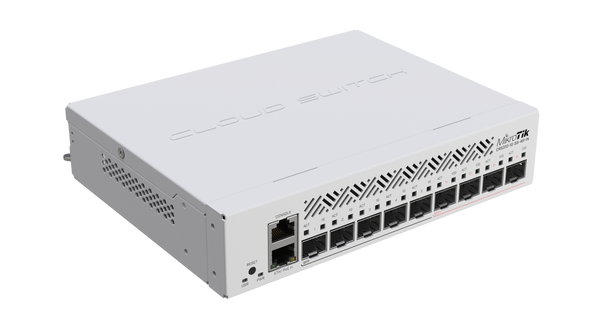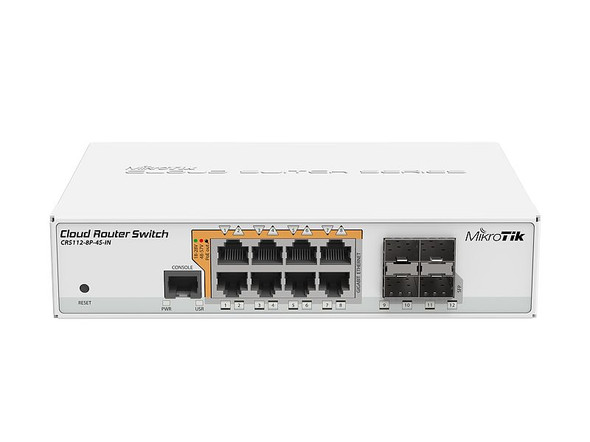Description
We wanted to see the full potential of the good, old, reliable 10G networking combined with a modern CPU. CCR2116-12G-4S+ allows you to forget about CPU limitations in your setup. Like its younger brother – the amazing CCR2004, this router features the mighty Amazon Annapurna Labs Alpine CPU.
But with 16 cores running at 2 GHz, this CCR eats the other one for breakfast. For example, we see at least a 15% increase in single-core performance. And that is the most important aspect when it comes to heavy operations based on per-connection processing. Like queues, for example. CCR2116-12G-4S+ sets a new standard of single-core performance in the whole CCR product family! And it supports Layer 3 Hardware Offloading!
Obviously, you need the right connectivity to harness this power. There are four 10G SFP+ ports. They have a separate, full-duplex line connected to the Marvell Aldrin family switch chip. Then we have Gigabit Ethernet ports. 12 of them are running through the Marvel chip. And there is another Gigabit port connected directly to the CPU. For management purposes.
Each group of 4 ports has a separate full-duplex connection to the switch chip. No bottlenecks here. You can expect switch-like throughput in most setups. The new generation of processors offers mind-blowing performance. If we look at the CCR1036 - the powerhouse with a 36 core CPU, the new CCR2116 can easily double the performance. 16 cores vs 36 cores. Double the performance. Or even more.
If you are a rather large ISP, dealing with dynamic routing, massive BGPs, complex firewall rules, and intricate quality of service configurations..This is the right device for you. Combination of raw power and utility with the reliable 10G networking. And yes, like with any ISP-level device, we’ve included a dual-redundant power supply. So you have one less thing to worry about.
CCR2116-12G-4S+: technology tested by time, built for the future.
Specifications
| Details | |
|---|---|
| Product code | CCR2116-12G-4S+ |
| Architecture | ARM 64bit |
| CPU | AL73400 |
| CPU core count | 16 |
| CPU nominal frequency | 2000 MHz |
| RouterOS license | 6 |
| Operating System | RouterOS (v7 only) |
| Size of RAM | 16 GB |
| Storage size | 128 MB |
| Storage type | NAND |
| MTBF | Approximately 200'000 hours at 25C |
| Tested ambient temperature | -20°C to 60°C |
Powering
| Details | |
|---|---|
| Number of AC inputs | 2 |
| AC input range | 100-240 |
| Max power consumption | 72 W |
| Max power consumption without attachments | 60 W |
| FAN count | 4 |
Ethernet
| Details | |
|---|---|
| 10/100/1000 Ethernet ports | 13 |
Fiber
| Details | |
|---|---|
| SFP+ ports | 4 |
Peripherals
| Details | |
|---|---|
| Serial console port | RJ45 |
| Number of M.2 slots | 1 |
Other
| Details | |
|---|---|
| CPU temperature monitor | Yes |
| PCB temperature monitor | Yes |
| Mode button | Yes |
Certification & Approvals
| Details | |
|---|---|
| Certification | CE, EAC, ROHS |
2 Reviews
-
Good 10Gbit router
Another excellent Mikrotik router. Previously used RB1100AHx4 in the past and had good experience with it. Opted for this to prepare for multi-gig fiber internet service. In meantime stress tested with a dual-10GbE-T server connected to a CRS312-4C+8XG-RM switch and then it attached to the CCR2116-12G-4S+ with two SFP+ DAC and got excellent results using RouterOS v7.9.1 firmware.
-
Powerful Edge, Core, and Firewall/NAT Router
I've got over a half-dozen of these handling BGP at the border, internally at the core, and as firewalls in datacenter installations. The Layer 3 hardware-assisted switching allows the 16 cores to be freed up for routing protocols, VPN tunnel aggregation, or even Docker containers, leveraging the onboard NVME slot.

















